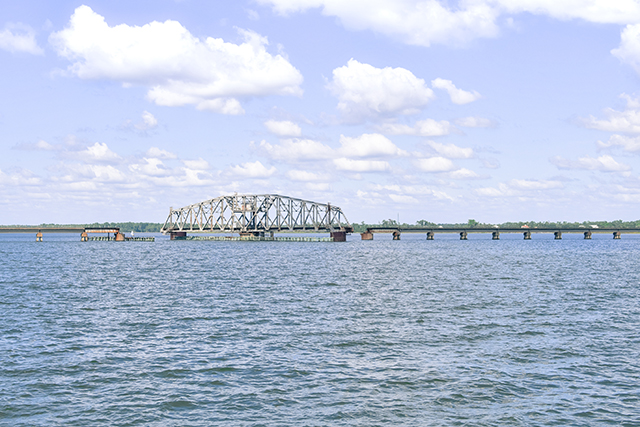CSX’s Removal of On-Site Bridgetenders Creates Unnecessary Risks to Boats, Trains, and Public Published: Apr 23 2020 11:55AM
Four major drawbridges in the Mississippi Gulf region operated by CSX Railroad will be controlled remotely starting Tuesday, posing significant safety concerns for the communities nearby.
Mobile River Bridge, Bayou Sara Bridge, Pascagoula River Bridge, and the Biloxi Bay Bridge will no longer have bridgetenders on site, with operations moving remotely to a control center in Mobile. There, CSX plans to have four operators manning 11 sections of drawbridges, beginning April 28. The Bay St. Louis Bridge will go remote-operated in the Fall 2020.
The Brotherhood of Maintenance of Way Employes Division of the International Brotherhood of Teamsters represents the CSX employees currently assigned to tending duties on all four bridges. The union feels that removing the bridge tender from the bridge poses a variety of safety problems.
For starters, barge captains, tug and shrimp boat captains, recreational boaters and anyone operating in the waterways beneath these bridges have not been properly advised to the new protocols and will no longer have a person located onsite to consult in case of emergency. In the case of bridge strikes, which happen periodically, there will no longer be an employee manning the bridge to witness the boat striking the bridge, assess the damage to the bridge and/or track. This potentially exposes an oncoming train to track conditions that could lead to a catastrophic derailment.
CSX, like many of their rival railroad companies, has implemented a Precision Scheduled Railroading operation strategy that includes, among other self-described “efficiencies,” longer trains. Train lengths have doubled to nearly two miles in length. If problems occur with remotely-controlled drawbridges while a train is approaching, there presents a great possibility that the train could be stopped for an hour or more awaiting a bridge tender to be dispatched to address the problem. Because the trains are so much longer under PSR, a two-mile long train stopped for two hours could cause serious disruptions to road crossings that normally are only stopped for a few minutes. Removing bridge tenders leaves the public vulnerable to potential track problems causing the halting or slowing of trains on road crossings, creating public safety (police, ambulance, fire) emergencies.
The bridges will have one less person onsite to deter trespassing and potential terrorist activity. Trespassers will feel more emboldened to walk out on dangerous bridges.
There is, of course, the reality that CSX is also cutting jobs during an economic crisis, a problem of deep concern for our Union and its members. These are well-paid, highly-skilled, pandemic “essential” positions that help create a robust and healthy economy within the Gulf Coast region. It is imperative that we save all these jobs, not cut them.
We hope that you will consider covering this developing story. If you would like to speak further to us, you can reach BMWED-IBT Communications Director Clark Ballew at 248-205-8327 or cballew@bmwe.org. From there, we can put you in contact with Union representatives in the region to answer your questions.
